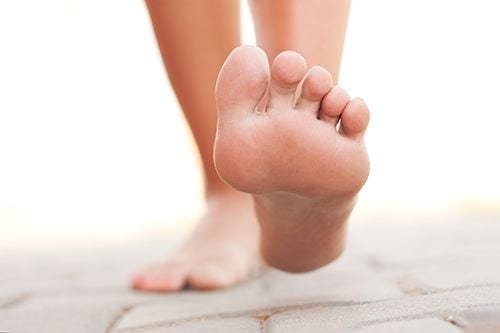Moving with diabetes is more difficult for those with persistent muscle aches and pains. Diabetic neuropathy causes nerve damage that can lead to tingling, pain, and numbness. Find out what may cause pain when you have diabetes and how you can feel better.
What is Diabetic Neuropathy?
Diabetic neuropathy is a nerve disorder that affect people with diabetes. Some people have no symptoms. Others get tingling, pain, or loss of feeling in the extremities including the legs, feet, arms, and hands. Nerve problems can impact every organ system. Up to 70 percent of people with diabetes have some form of neuropathy. The condition is more common in people with diabetes who have other conditions such as poor blood glucose control, high blood pressure, high cholesterol, and obesity.
Possible Causes of Diabetic Neuropathy
Nerve damage makes it painful to move. Diabetic neuropathy can be caused by one or more factors. The biggest cause is out of control high blood sugar. Autoimmune factors can lead to nerve inflammation. Neurovascular issues may damage the blood vessels that transport nutrients and oxygen to the nerves. Other factors include the use of alcohol, smoking, genetics, and injuries, such as carpal tunnel syndrome. Almost any nerve can be affected by diabetes and symptoms may include pain, numbness, nausea, difficulty urinating, constipation, diarrhea, weakness, faintness, wasting of the muscles of the hands or feet, and a feeling of weakness.
Basic Types of Diabetic Neuropathy
Diabetic neuropathy can have an impact on various parts of the body, including the muscles and how they feel and function. Types of neuropathy include proximal, peripheral, focal, and autonomic. With proximal neuropathy, people feel pain in the hips, buttocks or thighs which can make their legs feel weak. Peripheral neuropathy causes pain or numbness in the arms, hands, feet, legs, or toes. Focal neuropathy makes nerves feel suddenly weak, leading to muscle pain and weakness which can affect any nerve in the body. Autonomic neuropathy leads to digestive changes as well as functional issues with the bowel, bladder, perspiration, and sexual response. It can also impact the nerves serving the heart, causing changes in blood pressure. Diabetic neuropathies can affect the eyes, digestive system, heart, muscles, and other parts of the body as well as a variety of bodily functions. The best way to try to prevent neuropathy is to maintain healthy blood glucose levels.
Diagnosis of Diabetic Neuropathy
Diabetic neuropathies are often diagnosed through a physical exam. Typically, the person with diabetes explains his or her symptoms to the doctor. The doctor checks the person’s blood pressure, heart rate, and muscle strength. The patient will change positions, and the doctor will assess his or her reflexes and sensitivity. Other aspects that might be checked include touch, temperature, and vibration. Always have the doctor check your feet during routine exams. Other tests that might be done to diagnose neuropathy include electromyography or nerve conduction studies, ultrasounds, and a check of heart rate variability.
Regular Foot Exams
People with diabetes should have an annual foot exam to check for neuropathy. People with peripheral neuropathy need to get foot exams more often. During the exam, the doctor checks the muscles, skin, sensation, and bones of the feet. Sometimes a monofilament is used to check for feeling in the feet. A tuning fork might be used to assess vibration and temperature sensitivity might also be checked. Visual foot exams should be performed at every visit.
Treatments to Relieve Diabetic Neuropathy
The first step to treating diabetic neuropathy is the get blood glucose levels controlled. This is done through strategies such as daily exercise, a healthy diet, blood sugar monitoring, and the administration of insulin and other medications. Treatment depends on the type of neuropathy and its severity. Medications might be prescribed to relieve nerve and muscle pain. Topical treatments might be used on the skin of the feet, such as lidocaine patches and capsaicin cream. Other treatments that are used to relieve pain include physical therapy, acupuncture, laser light therapy, biofeedback, and nerve stimulation.
Taking Care of the Feet

Diabetes, Fatigue, and Muscle Aches
People with diabetes often feel fatigued with achy muscles. This can be as a result of things that can cause type 2 diabetes, such as obesity and a lack of physical activity. Uncontrolled diabetes and high glucose levels can also cause fatigue. Sleep apnea, when a person stops breathing while sleeping, can disrupt sleep and lead to a feeling of fatigue and related muscle pain. Overweight people with diabetes may have obstructive sleep apnea, which can be treated with a CPAP machine that provides continuous air. Being overweight can put a strain on muscles and joints. Losing just five-ten percent of your total body weight can help. Try exercising in ten-minute intervals, three times a day, to fulfill your need of exercise. Be gentle without pushing your muscles. Try deliberate movements, such as Tai chi or yoga.
Diet Makes a Difference
Work with a diabetes nurse educator or dietitian to help you eat healthier foods in the proper portion sizes. Learn to read labels. Choose foods that are rich in nutrients and low in sugar, salt, and fats. Talk to your doctor about vitamin supplements to help relieve muscle pain. Some supplements that could help include vitamin D, vitamin B-12, alpha-lipoic acid, and acetyl-L-carnitine. Always consult with your doctor before taking any supplements to avoid contraindications.
Various Approaches to Pain Management
People who have trouble moving due to muscle aches can explore various approaches to pain management, based on the advice of their health care team. Physical approaches may include applying heat or cold to the affected area, rest, exercise, and massage therapy. Neurological approaches that can help include meditation and relaxation exercise, such as hobbies or playing with a pet. It may also help to keep the mind busy with challenges such as playing Sudoku or completing crossword puzzles. Alternative therapies may also make a difference, such as the use of essential oils, such as clove, ginger or rosemary. Some people find antioxidants relieve pain, such as turmeric, chamomile or Echinacea. Laughter can also relieve pain. Watch a comedy show or try laughter yoga for some relief. Consider talk therapy from a professional if you need to.
Diabetes is often linked with neuropathy, muscle pain, and fatigue. Healthy lifestyle habits, losing weight, regular exercise, and maintaining proper blood glucose control can make a difference. Talk to your doctor about ways to relieve pain and move forward with your life more comfortably.













Leave A Comment